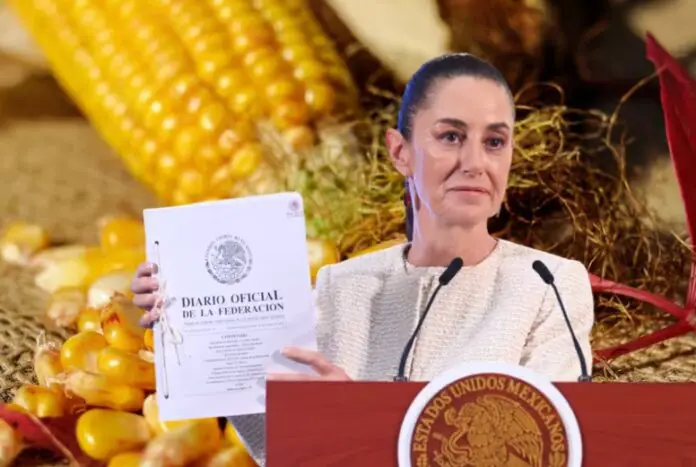Claudia Sheinbaum proposes to elevate the prohibition of genetically modified corn in Mexico to constitutional status, reports Julio Berdegué, head of Sader.
Banning genetically modified corn, pacifying the countryside, and achieving food sovereignty are the new government’s top priorities, according to Julio Berdegué Sacristán, the newly appointed head of the Secretariat of Agriculture and Rural Development (Sader).
In an exclusive interview with El Universal, the official confirmed that Claudia Sheinbaum seeks to elevate the prohibition of genetically modified corn to a constitutional level and pacify rural areas affected by organized crime, prioritizing the lemon-growing region of Apatzingán, Michoacán.
The new head of Sader highlighted that Sheinbaum’s government focuses its efforts on:
– Banning the cultivation and direct human consumption of genetically modified corn in Mexico.
– Pacifying agricultural areas, particularly those most affected by violence.
– Achieving food sovereignty by reducing dependence on imports.
– Providing labor rights to vulnerable day laborers.
– Releasing water for the countryside and cities through irrigation technology.
– Addressing climate change with agricultural technology programs and reducing deforestation.
The Constitution and genetically modified corn
One of the most ambitious strategies of this new cycle is to bring the prohibition of genetically modified corn to the constitutional text. Berdegué explained that the goal is to preserve the 64 races of native corn, considered a global genetic treasure.
“Corn is one of humanity’s main food sources, and in Mexico, we safeguard a genetic legacy that we must protect,” he assured.
The measure also responds to Mexico’s interests within the framework of the Mexico-United States-Canada Agreement (USMCA), where the next review is expected to include support for the Mexican stance on the cultivation and consumption of genetically modified corn.
Security in rural areas: the pacification plan
Insecurity and the impact of organized crime on the agricultural sector are other concerns that Sheinbaum’s government seeks to address with the pacification plan presented by the Secretariat of Citizen Security (SSC), led by Omar García Harfuch. According to Berdegué, it is not about creating an independent plan for the countryside but integrating agricultural areas into the national pacification effort. In this context, the lemon-growing region of Apatzingán, known for its citrus production and also for security issues, will be one of the first to be addressed.
The importance of water and agricultural technology
The Secretariat of Agriculture has identified the inefficient use of water in agriculture as a key challenge for the country, as the sector consumes around 75% of the available water in Mexico. Berdegué emphasized the need to move towards more efficient irrigation technologies that allow sustained production with less water consumption, benefiting both the countryside and cities.
Additionally, Sheinbaum’s government aims to reduce dependence on imports by supporting local farmers to produce more food domestically, boosting the rural economy, and creating jobs.
Commitment to the environment and climate change
Sheinbaum, who has extensive experience in environmental and climate change issues, understands the importance of adopting agricultural policies that not only protect biodiversity but also help mitigate the impact of climate change. To this end, a joint program with the Secretariat of Environment and Natural Resources (Semarnat) has been implemented to combat deforestation, a phenomenon largely driven by livestock farming and commercial plantations of products like avocado and agave.
Glyphosate: Continuity with AMLO’s Stance
The government will also maintain former President Andrés Manuel López Obrador’s stance on the use of glyphosate, aiming to replace this herbicide as soon as viable alternatives are available. Although Mexico imports between 20 and 25 million tons of glyphosate annually, Sader is open to adopting less harmful alternatives for health and the environment as soon as they become available.
Source: El Imparcial






